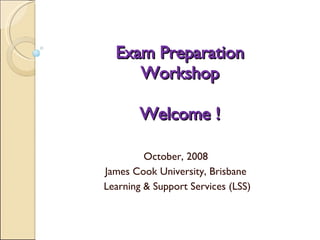Exam Preparation
•Télécharger en tant que PPT, PDF•
10 j'aime•6,299 vues
Exam Preparation Workshops
Signaler
Partager
Signaler
Partager

Contenu connexe
Tendances
Tendances (20)
Study Smart, Study Less – Improving Your Study Skills

Study Smart, Study Less – Improving Your Study Skills
23 Time Management Techniques of Insanely Busy People

23 Time Management Techniques of Insanely Busy People
Time management-Its Importance by Jamshed Mukhtar Khan

Time management-Its Importance by Jamshed Mukhtar Khan
En vedette
En vedette (20)
Teenage pregnancy and home environment factors in ogbomoso, nigeria

Teenage pregnancy and home environment factors in ogbomoso, nigeria
Similaire à Exam Preparation
Similaire à Exam Preparation (20)
Test Preparation and Test Taking Strategies DRES website edition.ppt

Test Preparation and Test Taking Strategies DRES website edition.ppt
Test Preparation and Test Taking Strategies DRES website edition.ppt

Test Preparation and Test Taking Strategies DRES website edition.ppt
Test Construction and Administering classroom examinations.pptx

Test Construction and Administering classroom examinations.pptx
Mastering the Test: Winning Test-Taking Strategies 

Mastering the Test: Winning Test-Taking Strategies
Dernier
Mehran University Newsletter Vol-X, Issue-I, 2024

Mehran University Newsletter Vol-X, Issue-I, 2024Mehran University of Engineering & Technology, Jamshoro
Making communications land - Are they received and understood as intended? we...

Making communications land - Are they received and understood as intended? we...Association for Project Management
Dernier (20)
Unit 3 Emotional Intelligence and Spiritual Intelligence.pdf

Unit 3 Emotional Intelligence and Spiritual Intelligence.pdf
Sensory_Experience_and_Emotional_Resonance_in_Gabriel_Okaras_The_Piano_and_Th...

Sensory_Experience_and_Emotional_Resonance_in_Gabriel_Okaras_The_Piano_and_Th...
ICT role in 21st century education and it's challenges.

ICT role in 21st century education and it's challenges.
UGC NET Paper 1 Mathematical Reasoning & Aptitude.pdf

UGC NET Paper 1 Mathematical Reasoning & Aptitude.pdf
Micro-Scholarship, What it is, How can it help me.pdf

Micro-Scholarship, What it is, How can it help me.pdf
Interdisciplinary_Insights_Data_Collection_Methods.pptx

Interdisciplinary_Insights_Data_Collection_Methods.pptx
Python Notes for mca i year students osmania university.docx

Python Notes for mca i year students osmania university.docx
Making communications land - Are they received and understood as intended? we...

Making communications land - Are they received and understood as intended? we...
Exam Preparation
- 1. Exam Preparation Workshop Welcome ! October, 2008 James Cook University, Brisbane Learning & Support Services (LSS)
- 7. Example 1 - Study Timetable Sat Sun Mon Tues Wed Thurs Fri 9-11 Acctg 11- 12 Break 8-11 Acctg 9 -12 Acctg Exam 9-11 Econ 9 -12 Econ Exam 9-11 Mktg 11-1 Break 12-3 Acctg 11-1 Break 12-6 Break 11-12 Break 12-3 Break 11-1 Break 1-3 Acctg 3-6 Break 1-4 Acctg 6-8 Econ 12-3 Mktg 3-5 Mktg 1-4 Mktg Exam 3-5 Break 6-8 Econ 4-6 Break 8-9 Break 3-6 Break 5-8 Break Rest! Party! 5-7 Econ 6-9 Econ 9-10 Mktg 6-9 Econ 8-10 Mktg
- 19. Thank You & Good Luck